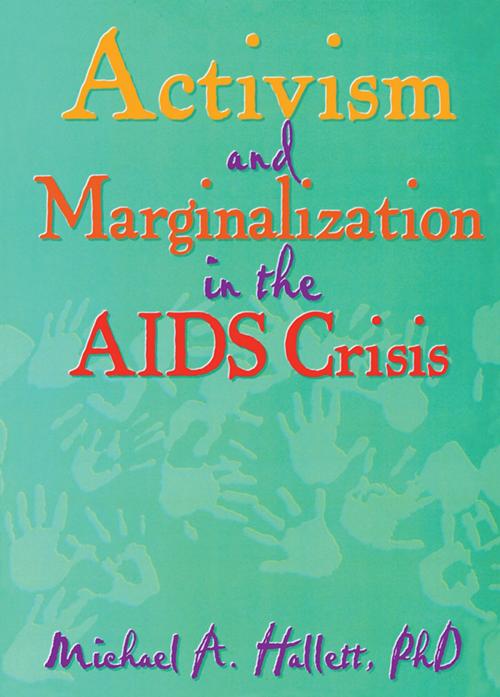Activism and Marginalization in the AIDS Crisis
Nonfiction, Health & Well Being, Health, Ailments & Diseases, AIDs & HIV, Social & Cultural Studies, Social Science, Gender Studies, Gay Studies, Medical| Author: | Michael A Hallett | ISBN: | 9781317957928 |
| Publisher: | Taylor and Francis | Publication: | June 11, 2014 |
| Imprint: | Routledge | Language: | English |
| Author: | Michael A Hallett |
| ISBN: | 9781317957928 |
| Publisher: | Taylor and Francis |
| Publication: | June 11, 2014 |
| Imprint: | Routledge |
| Language: | English |
Activism and Marginalization in the AIDS Crisis shows readers how the advent of HIV-disease has brought into question the utility of certain forms of “activism” as they relate to understanding and fighting the social impacts of disease. This informative and powerful book is centrally concerned about the ways in which institutionally governed social constructions of HIV/AIDS affect policy and public images of the disease more so than activist efforts. It asserts that an accounting of the power institutional structures have over the dominant social constructions of HIV disease is fundamental to adequate forms of present and future AIDS activism.
Chapters in Activism and Marginalization in the AIDS Crisis demonstrate how, despite what is thought of as the “successful activism” of the past decade, the claims of the HIV-positive are still being ignored, still being marginalized, and still being administratively “handled” and exploited even as the plight of those who find themselves HIV-positive worsens. Although chapters reject the assertion that activism has been a highly effective remedy to HIV-positive voicelessness, authors do not deny that activists have been vocal, but that they continue to be ignored despite their vocality.
Contributors in Activism and Marginalization in the AIDS Crisis offer numerous examples of institutional control and demonstrate that institutional structures, and not activists, are controlling the public meaning of HIV-related issues. Readers learn how messages about HIV/AIDS are produced, negotiated, modified, and sustained through institutional mechanisms that serve mostly institutional interests rather than those of the HIV-positive. In gaining an understanding of these issues, readers will begin to learn how to modify and strengthen activist efforts with valuable insight on:
-
the lack of HIV-positive voices in mainstream news portrayals of HIV/AIDS
-
research on constructions of HIV-disease at the state government level
-
social constructions and how they affect HIV/AIDS policy
-
the political construction of AIDS and interest-based struggles
-
the emergent “bio-politics” of HIV and homosexuality in the U.S.
-
how institutional power works to govern public understanding of HIV disease
Institutional structures are defined in this book as groups engaged in and defined by the production of various “truths” which sustain them. Institutional power may be defined as the capacity to regulate, constrain, and disseminate versions of “truth.” Activism and Marginalization in the AIDS Crisis reveals how HIV activist groups have been outmaneuvered when it comes to the production and dissemination of various “truths” about HIV/AIDS by institutional structures more deeply steeped in social legitimacy and which have a superior capacity for message dissemination.
HIV/AIDS activists, HIV-positive persons and those with AIDS, HIV/AIDS educators, public and institutional policymakers, health professionals, and the general public will find this book essential to understanding the social constructions of HIV/AIDS, how these affect HIV/AIDS-related policy and public opinion, and how to begin to cipher through the plethora of information to find and promote the “truth.”
Activism and Marginalization in the AIDS Crisis shows readers how the advent of HIV-disease has brought into question the utility of certain forms of “activism” as they relate to understanding and fighting the social impacts of disease. This informative and powerful book is centrally concerned about the ways in which institutionally governed social constructions of HIV/AIDS affect policy and public images of the disease more so than activist efforts. It asserts that an accounting of the power institutional structures have over the dominant social constructions of HIV disease is fundamental to adequate forms of present and future AIDS activism.
Chapters in Activism and Marginalization in the AIDS Crisis demonstrate how, despite what is thought of as the “successful activism” of the past decade, the claims of the HIV-positive are still being ignored, still being marginalized, and still being administratively “handled” and exploited even as the plight of those who find themselves HIV-positive worsens. Although chapters reject the assertion that activism has been a highly effective remedy to HIV-positive voicelessness, authors do not deny that activists have been vocal, but that they continue to be ignored despite their vocality.
Contributors in Activism and Marginalization in the AIDS Crisis offer numerous examples of institutional control and demonstrate that institutional structures, and not activists, are controlling the public meaning of HIV-related issues. Readers learn how messages about HIV/AIDS are produced, negotiated, modified, and sustained through institutional mechanisms that serve mostly institutional interests rather than those of the HIV-positive. In gaining an understanding of these issues, readers will begin to learn how to modify and strengthen activist efforts with valuable insight on:
-
the lack of HIV-positive voices in mainstream news portrayals of HIV/AIDS
-
research on constructions of HIV-disease at the state government level
-
social constructions and how they affect HIV/AIDS policy
-
the political construction of AIDS and interest-based struggles
-
the emergent “bio-politics” of HIV and homosexuality in the U.S.
-
how institutional power works to govern public understanding of HIV disease
Institutional structures are defined in this book as groups engaged in and defined by the production of various “truths” which sustain them. Institutional power may be defined as the capacity to regulate, constrain, and disseminate versions of “truth.” Activism and Marginalization in the AIDS Crisis reveals how HIV activist groups have been outmaneuvered when it comes to the production and dissemination of various “truths” about HIV/AIDS by institutional structures more deeply steeped in social legitimacy and which have a superior capacity for message dissemination.
HIV/AIDS activists, HIV-positive persons and those with AIDS, HIV/AIDS educators, public and institutional policymakers, health professionals, and the general public will find this book essential to understanding the social constructions of HIV/AIDS, how these affect HIV/AIDS-related policy and public opinion, and how to begin to cipher through the plethora of information to find and promote the “truth.”















